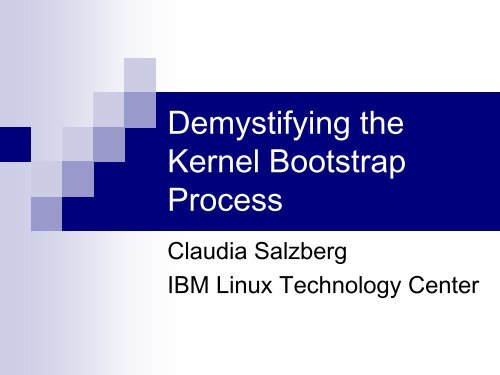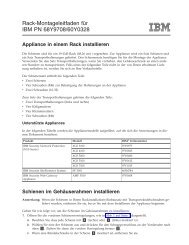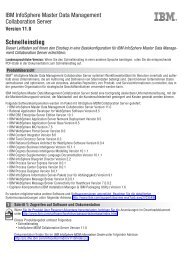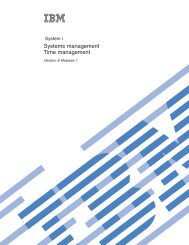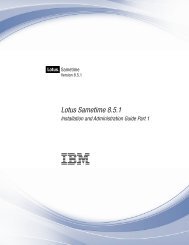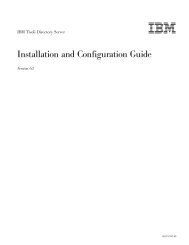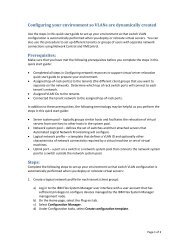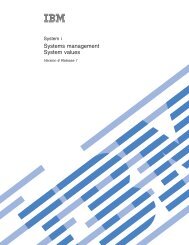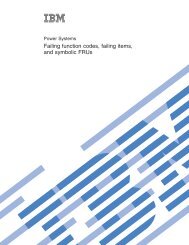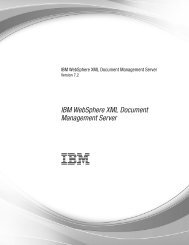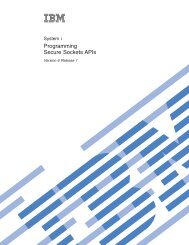Demystifying the Kernel Bootstrap Process - IBM
Demystifying the Kernel Bootstrap Process - IBM
Demystifying the Kernel Bootstrap Process - IBM
You also want an ePaper? Increase the reach of your titles
YUMPU automatically turns print PDFs into web optimized ePapers that Google loves.
<strong>Demystifying</strong> <strong>the</strong><br />
<strong>Kernel</strong> <strong>Bootstrap</strong><br />
<strong>Process</strong><br />
Claudia Salzberg<br />
<strong>IBM</strong> Linux Technology Center
Overview<br />
• Highlight <strong>the</strong> multiple levels of <strong>the</strong><br />
bootstrap process.<br />
• Explain <strong>the</strong> purpose of each of <strong>the</strong>se<br />
levels.<br />
• Illustrate how <strong>the</strong>se levels interleave and<br />
interrelate
Booting <strong>Process</strong> Overview<br />
Power On BIOS Boot Loader <strong>Kernel</strong> Init System Init<br />
Hardware init<br />
• BIOS<br />
Hardware initialization upon PC power-up. This involves a basic<br />
memory check, <strong>the</strong> initialization of key devices, and <strong>the</strong><br />
determination of bootable devices.<br />
• Boot Loader<br />
Identifies bootable images, places <strong>the</strong> selected image into memory<br />
and jumps to its point of entry for execution.<br />
• <strong>Kernel</strong> Initialization<br />
Linux kernel takes control of system. It initializes its subsystems,<br />
probes and initializes for particular devices. Jumps to init process<br />
• System Initialization
Hardware Power On<br />
BIOS<br />
Power On Boot Loader <strong>Kernel</strong> Init System Init<br />
Hardware Init<br />
• Main memory is empty.<br />
• CPU begins execution by accessing a pre-defined address in ROM<br />
intended for <strong>the</strong> initial boot process (0x000F:FFF0).<br />
• BIOS ROM (firmware) is loaded to main memory<br />
• BIOS performs basic tests on <strong>the</strong> hardware<br />
Initializes <strong>the</strong> keyboard, video card, system board, memory, and<br />
identifies additional I/O devices.<br />
Examines first sector of bootable disk for <strong>the</strong> MBR<br />
Copies first 512 bytes from boot device (boot sector) to 0x7c00 (tests for<br />
valid signature)<br />
• MBR determines active boot partition and jumps to it<br />
• Boot Loader is located in active boot partition (can also be<br />
elsewhere)
A Closer Look at <strong>the</strong> MBR<br />
Partition Table<br />
0xAA55<br />
+0x1fe<br />
+0x1be<br />
• MBR is 512-byte boot sector in PC architecture<br />
• Located in first sector of hard drive (/dev/hda)<br />
• Contains<br />
1. Master Boot Code/boot loader code (446<br />
bytes)<br />
2. Drive’s Partition Table (4 16-byte entries)<br />
3. MBR signature (2 bytes)<br />
Boot Loading Code<br />
Partition Table Entry (16 bytes)<br />
Partition Length<br />
Offset<br />
Ending Cylinder/Head/Sector of Boot Partition<br />
Partition Type<br />
Starting Cylinder/Head/Sector of Boot Partition<br />
Active Boot Partition Flag<br />
+0x000
View of Memory over Time<br />
0x100000<br />
Current Addressing Mode:<br />
Real Mode<br />
0x90020<br />
0x90000<br />
Protected Mode<br />
0x10000<br />
MBR<br />
0x7c00<br />
BIOS<br />
0x1000<br />
0x0000
Jump to Boot Loader: LILO<br />
Power On BIOS Boot Loader <strong>Kernel</strong> Init System Init<br />
Hardware init<br />
• What is a Boot Loader?<br />
A limited functionality program dedicated to spanning <strong>the</strong> gap between<br />
firmware routines and <strong>the</strong> full fledged operating system.<br />
• LILO is one of <strong>the</strong> earliest boot-loading programs<br />
• Located in MBR (or root partition)<br />
• Makes use of BIOS functions (Interrupt calls) to load sectors<br />
• Basic Steps:<br />
Load operating system into memory<br />
Load ramdisk (optional)<br />
Pass kernel arguments to kernel<br />
Transfer execution to kernel
Jump to Boot Loader: LILO<br />
Power On BIOS Boot Loader <strong>Kernel</strong> Init System Init<br />
Hardware init<br />
• Load <strong>Kernel</strong> into Memory<br />
Copies kernel image referenced in /etc/lilo.conf from hard drive using<br />
BIOS services<br />
Loads kernel image to 0x90000 (using firmware functions):<br />
• 0x900000 (bootsect sector)<br />
• 0x900200 (setup sector)<br />
• 0x1000000 (compressed image)<br />
Jumps to label start_of_setup @ 0x90200<br />
• Alternative to bootloader – using bootsect.S
<strong>Kernel</strong> Image Topology<br />
• Building <strong>the</strong> kernel Image:<br />
<br />
<br />
<br />
<br />
User input of make zImage or make bzImage<br />
All C and assembly source files are compiled and linked into vmlinux<br />
nm vmlinux => System.map<br />
arch/i386/boot<br />
Type of <strong>Kernel</strong> Image IMAGE_OFFSET Preprocessor Flags<br />
bzImage 0x100000 -D__BIG_KERNEL__<br />
zImage<br />
0x1000<br />
<br />
<br />
<br />
<br />
bootsect.S is assembled into bootsect.s and converted into raw binary form<br />
setup.S is assembled into setup.s and converted into raw binary form<br />
arch/i386/boot/compressed<br />
• Remove .note and .comment ELF sections from vmlinux<br />
• Gzip vmlinux<br />
• Compile compression routines in head.S and misc.c and link into vmlinux.out<br />
arch/boot/tools/build [-b] bootsect setup system [rootdev] [> image]<br />
• Concatenates bootsect, setup, and compressed/vmlinux.out into zImage
View of Memory over Time<br />
Setup.S<br />
Bootsect.S<br />
0x100000<br />
0x90020<br />
0x90000<br />
Current Addressing Mode:<br />
Real Mode<br />
Protected Mode<br />
Compressed Code<br />
Uncompressed Code<br />
0x10000 (64K)<br />
MBR<br />
BIOS<br />
0x7c00<br />
0x1000 (4K)<br />
0x0000
Setup.S Execution<br />
Setup.S<br />
Bootsect.S<br />
Compressed Code<br />
Head.S, misc.c<br />
0x0009:0020<br />
0x0009:0000<br />
0x0001:0000 (64K)<br />
Jump to 0x0009:0020<br />
Get system data from BIOS and<br />
generate memory map<br />
Initialize hardware<br />
Move compressed kernel<br />
Set up provisional IDT and GDT<br />
Change from real to protected mode<br />
Jump to head.S startup_32()<br />
MBR<br />
0x0000:7c00<br />
0x0000:1000
<strong>Kernel</strong> Initialization<br />
Power On BIOS Boot Loader<br />
<strong>Kernel</strong> Init System Init<br />
Hardware init<br />
• The jump to startup_32 (head.S)<br />
Initialize page tables<br />
• The jump to start_kernel() (init/main.c)<br />
Initialize all <strong>the</strong> kernel subsystems<br />
Execute Init()
Head.S execution - startup_32()<br />
Uncompressed<br />
kernel<br />
Initialize page tables, enable paging<br />
Setup.S<br />
0x0010:0000 (1 MB)<br />
0x0009:0020<br />
0x0009:0000<br />
Set-up stack (zero out BSS)<br />
Call decompress_kernel()<br />
Uncompressing Linux…<br />
Ok, booting <strong>the</strong> kernel.<br />
0x0001:0000 (64K)<br />
Jump to start_kernel()<br />
Compressed Code<br />
0x0000:7c00<br />
Head.S, misc.c<br />
0x0000:1000 (4K)<br />
0x0000:0000
High level initialization: start_kernel() to init()<br />
CONFIG_SMP=y<br />
lock_kernel()<br />
CONFIG_HIGHMEM=y<br />
page_address_init() printk(linux_banner) setup_arch()<br />
CONFIG_SMP=y<br />
setup_per_cpu_areas()<br />
CONFIG_HOTPLUG_CPU=y<br />
CONFIG_SMP=y<br />
parse_args()<br />
printk()<br />
page_alloc_init()<br />
build_all_zonelists()<br />
smp_prepare_boot_cpu()<br />
trap_init() rcu_init() Init_IRQ() pid_hash_init() sched_init()<br />
local_irq_enable()<br />
profile_init()<br />
console_init()<br />
time_init()<br />
soft_irq_init()<br />
mem_init() kmem_cache_init() Calibrate_delay() pgtable_cache_init()<br />
buffer_init()<br />
rest_init()<br />
init_idle()<br />
signals_init()<br />
vfs_caches_init()<br />
Security_scaffolding_<br />
startup()
setup_arch(&command_line)<br />
• Takes in a pointer to Linux command-line data entered<br />
at boot time<br />
• Initializes architecture-specific subsystems<br />
• Grabs data from boot time structures<br />
• Identifies <strong>the</strong> processor<br />
• Grabs and performs early parsing of boot time<br />
parameters<br />
• Calls paging_init()
High level initialization: start_kernel() to init()<br />
CONFIG_SMP=y<br />
CONFIG_HIGHMEM=y<br />
CONFIG_SMP=y<br />
lock_kernel()<br />
page_address_init() printk(linux_banner) setup_arch() setup_per_cpu_areas()<br />
CONFIG_HOTPLUG_CPU=y<br />
Paging is finalized<br />
CONFIG_SMP=y<br />
parse_args()<br />
printk()<br />
page_alloc_init()<br />
build_all_zonelists()<br />
smp_prepare_boot_cpu()<br />
<strong>Kernel</strong> command line…<br />
trap_init() rcu_init() Init_IRQ() pid_hash_init() sched_init()<br />
local_irq_enable()<br />
profile_init()<br />
console_init()<br />
time_init()<br />
soft_irq_init()<br />
Interrupts are enabled<br />
mem_init() kmem_cache_init() Calibrate_delay() pgtable_cache_init()<br />
buffer_init()<br />
Numphyspages determined<br />
Initializes <strong>the</strong> slab allocator<br />
Release of bootmem<br />
rest_init()<br />
init_idle()<br />
signals_init()<br />
vfs_caches_init()<br />
Security_scaffolding_<br />
startup()
uild_all_zonelists()<br />
• Splits up memory into <strong>the</strong> three zones:<br />
ZONE_DMA<br />
ZONE_NORMAL<br />
ZONE_HIGHMEM<br />
• zones: linear separations of physical memory that are<br />
used to address hardware limitations
High level initialization: start_kernel() to init()<br />
CONFIG_SMP=y<br />
CONFIG_HIGHMEM=y<br />
CONFIG_SMP=y<br />
lock_kernel()<br />
page_address_init() printk(linux_banner) setup_arch() setup_per_cpu_areas()<br />
CONFIG_HOTPLUG_CPU=y<br />
Paging is finalized<br />
CONFIG_SMP=y<br />
parse_args()<br />
printk()<br />
page_alloc_init()<br />
build_all_zonelists()<br />
smp_prepare_boot_cpu()<br />
<strong>Kernel</strong> command line…<br />
Memory zones are created<br />
trap_init() rcu_init() Init_IRQ() pid_hash_init() sched_init()<br />
Traps Initialized<br />
Interrupts Initialized<br />
local_irq_enable()<br />
profile_init()<br />
console_init()<br />
time_init()<br />
soft_irq_init()<br />
mem_init() kmem_cache_init() Calibrate_delay() pgtable_cache_init()<br />
buffer_init()<br />
rest_init()<br />
init_idle()<br />
signals_init()<br />
vfs_caches_init()<br />
Security_scaffolding_<br />
startup()
sched_init()<br />
• Routine to initialize scheduler<br />
• Each CPU’s runqueue is initialized (active queue, expired queue,<br />
and spinlock)<br />
rq<br />
lock<br />
= 1<br />
prio_array_t *active<br />
prio_array_t *expired<br />
prio_array_t arrays<br />
best_expired_prio<br />
= MAX_PRIO
softirq_init()<br />
• Prepares <strong>the</strong> CPU to accept notification from tasklets<br />
• <strong>Kernel</strong> response time upon interrupts are kept small by splitting <strong>the</strong><br />
interrupt-generated task into tasklets that can be queued and<br />
handled at a different time.<br />
• Event:<br />
Interrupt is generated by some device<br />
The interrupt handler schedules a tasklet (softirq) and exits<br />
Eventually, tasklet is executed.
High level initialization: start_kernel() to init()<br />
CONFIG_SMP=y<br />
CONFIG_HIGHMEM=y<br />
CONFIG_SMP=y<br />
lock_kernel()<br />
page_address_init() printk(linux_banner) setup_arch() setup_per_cpu_areas()<br />
CONFIG_HOTPLUG_CPU=y<br />
Paging is finalized<br />
CONFIG_SMP=y<br />
parse_args()<br />
printk()<br />
page_alloc_init()<br />
build_all_zonelists()<br />
smp_prepare_boot_cpu()<br />
<strong>Kernel</strong> command line…<br />
Memory zones are created<br />
trap_init() rcu_init() Init_IRQ() pid_hash_init()<br />
sched_init()<br />
Traps Initialized<br />
Interrupts Initialized<br />
Scheduler created<br />
local_irq_enable()<br />
profile_init()<br />
console_init()<br />
time_init()<br />
soft_irq_init()<br />
Interrupts are enabled<br />
Tasklets enabled<br />
mem_init() kmem_cache_init() Calibrate_delay()<br />
pgtable_cache_init()<br />
buffer_init()<br />
Numphyspages determined<br />
Release of bootmem<br />
Initializes <strong>the</strong> slab allocator<br />
BogoMips!<br />
rest_init()<br />
init_idle()<br />
signals_init()<br />
vfs_caches_init()<br />
Security_scaffolding_<br />
startup()
est_init()<br />
static void noinline rest_init(void)<br />
{<br />
kernel_t h read(init, NULL, CLONE_FS | CLONE_SIGHAND);<br />
unlock_kernel();<br />
cpu_idle();<br />
}<br />
• Creates <strong>the</strong> init thread<br />
• Removes <strong>the</strong> kernel lock<br />
• Calls <strong>the</strong> idle thread
High level initialization: start_kernel() to init()<br />
CONFIG_SMP=y<br />
CONFIG_HIGHMEM=y<br />
CONFIG_SMP=y<br />
lock_kernel()<br />
page_address_init() printk(linux_banner) setup_arch() setup_per_cpu_areas()<br />
CONFIG_HOTPLUG_CPU=y<br />
Paging is finalized<br />
CONFIG_SMP=y<br />
parse_args()<br />
printk()<br />
page_alloc_init()<br />
build_all_zonelists()<br />
smp_prepare_boot_cpu()<br />
<strong>Kernel</strong> command line…<br />
Memory zones are created<br />
trap_init() rcu_init() Init_IRQ() pid_hash_init() sched_init()<br />
Traps Initialized<br />
Interrupts Initialized<br />
Scheduler created<br />
local_irq_enable()<br />
profile_init()<br />
console_init()<br />
time_init()<br />
soft_irq_init()<br />
Interrupts are enabled<br />
Tasklets enabled<br />
mem_init() kmem_cache_init() Calibrate_delay()<br />
pgtable_cache_init()<br />
buffer_init()<br />
Numphyspages determined<br />
Release of bootmem<br />
Initializes <strong>the</strong> slab allocator<br />
BogoMips!<br />
rest_init()<br />
init_idle()<br />
signals_init()<br />
vfs_caches_init()<br />
Security_scaffolding_<br />
startup()
The End of <strong>Kernel</strong> Initialization:<br />
init()<br />
• Set to reap any thread whose parent has died<br />
• Initializes<br />
<br />
<br />
<br />
<br />
<br />
<br />
<br />
<br />
Driver model and subsystems involved in driver support<br />
Sysctl interface<br />
Network socket interface<br />
Work queue support<br />
Prepares <strong>the</strong> namespace for <strong>the</strong> filesystem hierarchy<br />
Mounts /dev, nfs root mount, root device mounting<br />
Calls free_initmem() to clear memory segments with __init.<br />
run_init_process("/sbin /init");
Lessons Learned<br />
• The boot process has multiple steps each<br />
of which is dependent on its predecessor<br />
• Many structures and functions are created<br />
that are only temporary


